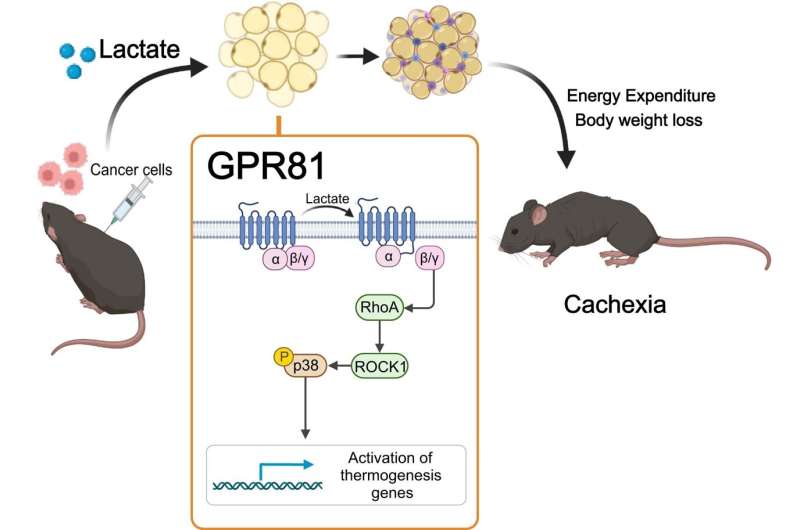This article has been reviewed according to Science X's editorial process and policies. Editors have highlighted the following attributes while ensuring the content's credibility:
fact-checked
trusted source
proofread
Why do cancer patients lose weight? Study points to elevated lactate levels

Elevated levels of lactate may lead to the development of cachexia (disease-related weight loss) following the onset of cancer, according to a study including data from mice and humans published in Nature Metabolism.
Cachexia is a metabolic syndrome characterized by the loss of body fat and muscle mass and affects about 50%–80% of cancer patients. The condition results in a deterioration in quality of life and poor tolerance to cancer therapies, and accounts for 20% of cancer deaths. Previous research has shown that cancer can significantly alter the host's metabolism and levels of certain metabolic products, but how and why cachexia occurs and how it can be treated is unknown.
Xinli Hu, Rui-Ping Xiao, and colleagues screened metabolite levels in the blood from patients and mice with cancer cachexia, identifying elevated lactate levels that correlated with the degree of body weight lost.
To investigate this further, the authors implanted mice with human cancer cells and found that elevated lactate levels could trigger extensive transformation of white adipose tissue (body fat), including increased browning and lipolysis (breakdown of fat), via the GPR81 receptor on white adipose tissue.
They illustrate that lactate can bind to this receptor and activate signals within the cells to increase metabolic activity in adipose tissue, which initiates the loss of fat and muscle mass and eventually body weight. The authors also highlight that inhibiting GPR81 was seen to limit tumor growth in mice.
The authors suggest that their findings indicate that lactate may have a role in cachexia development and that targeted ablation of its receptor GPR81 may be a potential therapeutic strategy for the treatment of cancer cachexia; however, they note that further research is necessary.
More information: Xidan Liu et al, Activation of GPR81 by lactate drives tumour-induced cachexia, Nature Metabolism (2024). DOI: 10.1038/s42255-024-01011-0



















